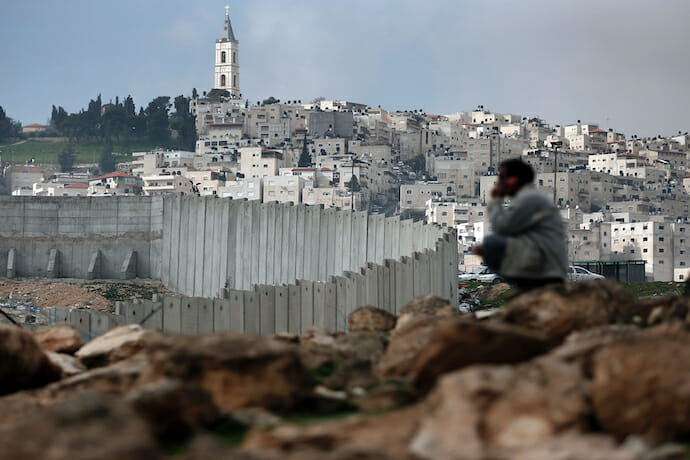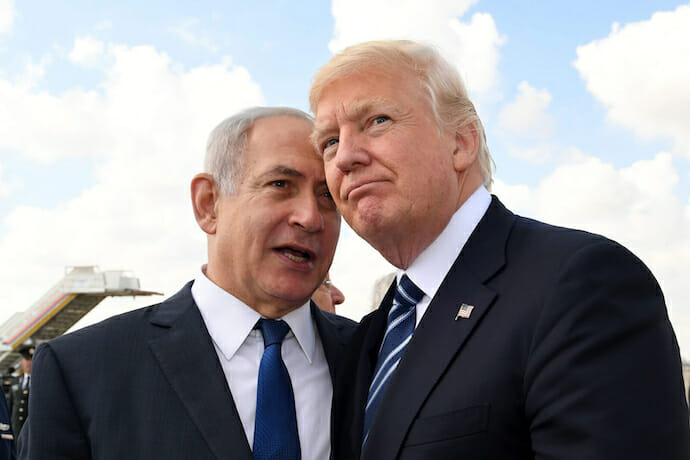
What’s in a Name? The U.S. Embassy in Jerusalem
Foreign policy under the Trump administration was, to put it mildly, incalculable, and unrestrained. Decisions with monumental impacts to national security and America’s standing abroad were made on what seemed to be the personal whims of Donald Trump. For four years, allies were abandoned, norms were upended, and longstanding American policy was routinely overturned for no discernable gain to the U.S. and with no warning. Nowhere was this more apparent than in the Middle East.
One of the most radical changes was the recognition of Jerusalem as the official capital of Israel and the relocation of the U.S. Embassy to Israel from Tel Aviv to the Holy City in December 2017. The decision was hailed by evangelical Christians in America and Likudniks in Israel as a long-overdue recognition of the facts on the ground. Critics pointed to decades of policy and norms that recognized Jerusalem as a city to be determined as part of a greater peace deal and worried about waves of unrest across the Middle East.
It now falls on the Biden administration to navigate the labyrinth of ethnic, religious, and political repercussions of this decision. However, where the Trump administration was a morass of chaos, Biden administration nominees are highly skilled practitioners of statecraft. With this incoming crop of talent, can the Biden administration maintain the position of the U.S. Embassy in Jerusalem while also salvaging the Middle East peace process?
Background – A City, Divided
As the British control of Palestine imploded, the singular territory became riven along ethnic and religious fault lines. One of these faults drove through the heart of Jerusalem, with the city split between Jordanian administration in the east and the Israelis controlling the western portion of the city. This division stood from 1949 until the phenomenal success of Israeli forces in 1967 when Israel absorbed the entirety of the West Bank and the eastern portion of Jerusalem.
Since those six days in 1967, an international consensus has formed around the idea that Jerusalem should be the capital for both Israel and a future, sovereign Palestinian state. The Green Line, the armistice line that divided the Israeli- and Jordanian-controlled portions of the city prior to 1967, emerged as arguably the most complicated point for any negotiations over the future status of the city, claimed by two nations as its capitals.
The international community repeatedly condemned Israeli unification of the city and called for the final status of the ancient city to be determined by negotiation, with multiple UN resolutions and long-standing norms leading to most diplomatic missions being based in Tel Aviv, with consular offices located in Jerusalem. Eventually, the status slipped beyond the international realm. In the U.S., domestic policy began to intertwine with foreign policy as Congress passed a law in 1995 requiring the relocation of the American Embassy from Tel Aviv to the disputed Holy City. The United States was the first nation to move its embassy to the disputed, divided city under the Trump administration.

Even as Israel solidified its hold over Jerusalem by unifying the entire city into one municipal government and passing a national law declaring it to be indivisible, a tacit acknowledgment of the Green Line stayed in place within Israel. The Knesset – Israel’s parliament – is located well within the boundaries of Western Jerusalem as determined by the Green Line, as is the entirety of the Israeli government apparatus.
In short, there’s an opportunity for the Biden administration to salvage the peace process, while also acknowledging the de facto nature of the Israeli government in Jerusalem. It’s all in the name.
A City by Any Name
The U.S. Embassy is referred to by multiple names, but most revolve around some version of “Embassy of the United States, Jerusalem” or “U.S. Embassy Jerusalem”. This follows the convention for other American embassies, such as U.S. Embassy Rome or U.S. Embassy Nicosia, another capital city divided by two rival claimants with a no-man’s land driven through the heart of the metropolis.
The Biden administration should change the name of the U.S. Embassy in Jerusalem to “Embassy of the United States, West Jerusalem”.
This name change seems deceptively simple, yet the implications of a simple change carry significance with lasting, positive impacts on American foreign policy. First, the name still recognizes the longstanding facts on the ground. Israeli control of the western portion of Jerusalem is uncontested, and the entirety of the Israeli government is within the confines of the western side of the Green Line. Regardless of the final outcome of negotiations over the city, Israel will hold the western portion of the city as it has for the better part of a century.
Second, the change in name clearly insinuates that a final outcome of the city includes plans for an “Eastern Jerusalem” and, by extension, an American mission to a Palestinian state. This is small, but meaningful. The accusations leveled against the United States for years has been that Washington is an unreliable partner in the Middle East peace process, and the “peace plans” proposed by the Trump administration gave ample evidence to Middle East observers that any pretense of fair arbitration was a thing of the past under Jared Kushner and Donald Trump. One small move towards recognizing a fair outcome, even by insinuation, will go a long way towards revitalizing trust in an American-led peace process.

Finally, this name change could possibly further incentivize the further development of embassies within West Jerusalem. Recognition of Jerusalem as the capital of Israel has been a key pillar of Israeli foreign policy for decades. Though they may continue to claim the status of Jerusalem as united and indivisible, something is better than nothing. If the United States can forge a path that not only meets the desires of its Israeli allies but also allows for tacit acknowledgment of a Palestinian capital in Eastern Jerusalem, it will be a diplomatic coup unlike any other in the tumultuous Middle East.
An Insurance Policy – A Resurgent Palestinian Cause
One of the most underappreciated aspects of the Trump administration’s foreign policy – likely obscured by the chaos and questionable calculus used during the last four years – was the incredible growth of recognition of Israel by states across the Middle East and North Africa. In one year, Bahrain, Sudan, and the United Arab Emirates all recognized Israel and launched a whirlwind of trade, communications, diplomatic, and defense arrangements. Combined with official trips to Saudi Arabia, a modern-day stately quadrille seems to be taking place across the heartland of Arab civilization.
This is not a result of any change in Arab-Israeli relations, so much as it is the risk of Iranian misery creating strange bedfellows. Israeli cooperation with the Gulf states has been robust and ongoing for years, becoming one of the worst-kept secrets in the Middle East. As Iran has expanded operations in Yemen, Syria, and Iraq, Gulf Arab states have gone from warily eying the Persian behemoth across the Gulf to actively preparing for the worst.
Though censorship and state-controlled media makes gauging public support in the Middle East nearly impossible, it seems from all indicators that the decisions by Bahrain and the UAE have not been met by the waves of protest and unrest that some predicted. So long as the Iranian threat remains, one can assume that these trends will continue, with potential recognition of Israel by the largest Iranian counterweight: Saudi Arabia. With meetings between Saudi Crown Prince Mohammed bin Salman and Israeli Prime Minister Benjamin Netanyahu coming in late 2020, this may happen soon.
In short, the Gulf Arab states have put the Palestinian cause in a deep freeze while working on the more immediate threats to their national security. Though lip service may continue to be paid to the Palestinian cause, the Gulf states have aligned with Jerusalem, rather than Ramallah.
However, it took decades to arrive at this moment. The alignment of Persian fears with the willingness of Arabs and Israelis to ally with one another took the creation of the Iranian nuclear program, discontent with the Obama era Joint Comprehensive Plan of Action, and the Iranian exploitation of the power vacuum created by the invasion of Iraq and the Arab Spring in Syria.
Should the Palestinian cause become the cause célèbre the path outlined above will assume even greater importance. Rather than encountering a major stumbling block to negotiations from day one, farsighted action will ensure maximum flexibility and avenues to success. All sides can benefit from this. The United States will maintain some semblance of dedication to fair negotiation, the Arab states can advocate for the Palestinian cause through previously inaccessible diplomatic channels, and Israel will maintain a level of recognition and relative safety that will come from the recent diplomatic success in the Middle East. Preventative action now may very well save the day at a later date once the peace process begins again, in earnest.
All from a name change.
Could It Be That Simple?
Though this change seems simplistic enough, it will encounter challenges both at home and abroad.
One of the most immediate concerns is that the U.S. Embassy in Jerusalem crosses the Green Line itself. The name change to “Western Jerusalem” would be completely disingenuous if the premises of the embassy itself undercuts the importance of the name change. The process of selecting a new location for the U.S. Embassy would be time-consuming, expensive, and fraught with political dangers. This does not even include the drawn-out process of designing the actual premises, which has to meet stringent security requirements and clear public competitions.
The Israeli government will most likely protest and do so vocally. While it will not take steps to degrade the all-important special relationship between Washington and Jerusalem, it will not hesitate to leverage assets and allies within the domestic political arena in America. The intersection between the modern evangelical right and Israeli special interest groups is strong, vocal, and well-funded. A change to the status of the U.S. Embassy in Jerusalem would likely come with some kind of counterattack in the form of a coherent message during mid-term elections or even a 2024 presidential race.
Finally, the single greatest obstacle to be overcome is the risk that this motion will fall on its face as soon as it is announced. Though geared to reinvigorate trust in American peace negotiations, it might be too little, too late. The Trump administration’s peace plan – essentially offering the creation of a Palestinian state as a 21st-century Bantustan – combined with the unilateral move of might have made any remaining goodwill for America in the region evanescent. While done with the best of intentions, a renaming of the embassy might amount to naught.
Certainly, this decision would be saddled with expectations and demands from all sides. With a conflict as multifaceted as that between the Palestinians and Israelis, finding a solution that pleases all sides is nigh impossible. Rather than pursuing the white whale of mutually agreeable solutions in the Middle East, the Biden administration would be well-served to pursue decisions that maximize room for maneuvering in future negotiations as well as firmly repudiating the reckless unilateralism of the Trump administration. Renaming the U.S. Embassy in Western Jerusalem is the first step on the long road to restoring American trustworthiness and credibility in the Middle East, while also honoring our commitments to our allies.

